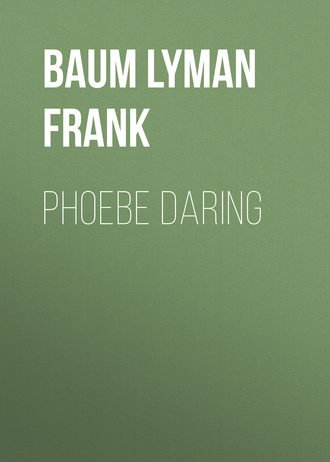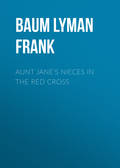
Лаймен Фрэнк Баум
Phoebe Daring
CHAPTER XIII
HOW TOBY SAW THE GREAT MAN
Mr. Spaythe himself opened the door and took a step backward in astonishment.
“Why, Governor – is it really you?” he stammered.
“Yes. Good evening, Spaythe. I’ve called to see Toby Clark.”
Mr. Spaythe led the way to the library, thoroughly amazed at the suddenly apparition of the state’s chief executive.
“I’ll call Toby,” he said briefly.
“Do not tell him who I am, please,” cautioned the governor. “I am simply Judith Eliot’s cousin, and am at present visiting her.”
“I understand, sir.”
Toby came stumping in on his crutch, with a smile for his friend Phoebe and a frank handshake for Miss Eliot’s cousin.
“I am a stranger here but have become interested in this unfortunate accusation against you,” began Cousin John, in his easy, conversational way. “No; don’t go away, Mr. Spaythe; there’s nothing private about this interview. I merely want Toby Clark to tell me his story and explain why they charge him with taking and rifling Mrs. Ritchie’s box.”
“The story is easy, sir, but the explanation is difficult,” replied Toby, and then he told in his own way the manner in which the circumstantial evidence against him had been found. The boy’s story did not differ materially from Phoebe’s, except that he added a few details that she had neglected to mention.
“I can scarcely blame them for their suspicions,” Toby concluded. “Being poor, they decided I longed for money and would not object to taking that which belonged to some one else. As I knew the contents of the box and had access to Judge Ferguson’s office, the conclusion is natural that I helped myself to Mrs. Ritchie’s money and bonds and afterward tried to hide the useless but incriminating papers and the box.”
“Who discovered the box, and afterward the papers?” asked the Governor.
“Our constable here, Sam Parsons. He is one of my best friends. But they sent a policeman over from Bayport to help him.”
“How did Parsons happen to search your premises for such evidence?”
Mr. Spaythe started to answer this question, but checked himself and remained silent. It was Toby who replied:
“After I was arrested, on a warrant sworn out by Mrs. Ritchie, her lawyer, a man named Kellogg, urged Parsons to search my house and yard. He did so, and found the box. Afterward Kellogg insisted on another search, and the papers were found.”
The governor looked grave.
“It is strong evidence,” said he, “and of the sort that convicts. Who stole the box, Mr. Spaythe?”
The banker started at the abrupt question.
“I – I haven’t an idea, sir.”
“Nor you, Toby?”
“No, sir. I’ve racked my brain many times in the attempt to guess; but I can’t suspect anyone, with justice.”
“Well, I am sorry for your misfortune, young man. You seem to be in a serious dilemma. It’s a peculiar case, to say the least of it, and I can only say I hope you’ll come out on top and with colors flying. All ready, Phoebe?”
As they walked back to the house the girl felt sorely disappointed over the result of the interview, from which she had hoped so much. The governor talked on all sorts of subjects except that of Toby Clark and she replied as cheerfully as she could. Not until they were in sight of the Daring house did he refer to the visit, and then it was to say absently:
“Kellogg – Kellogg. What’s the lawyer’s other name?”
“Abner, sir.”
“Fine fellow?”
“I don’t like him,” said Phoebe.
“Ah! Judith tells me you’re investigating this case yourself; posing as a sort of female detective.”
“Oh, no!” she protested. “Cousin Judith and I – merely in a laughing way and yet earnest in our desire to help Toby – organized a private conspiracy to probe the mystery in our own way and try to discover its solution. I suppose, sir, we are very foolish to think we can accomplish anything, but – ”
“But you may succeed, nevertheless. I believe in girls. When they’re sincere and determined they can accomplish wonders. By the way, keep an eye on Abner Kellogg.”
“The lawyer?” she asked in surprise.
“Yes. Ask yourself this question: Why did Abner Kellogg direct the constable to search Toby Clark’s premises? And now let us talk of something else, for here is Judith waiting for us.”
The governor had a jolly, restful evening. He played dominoes with Becky, who was allowed to sit up on this important occasion, and afterward, when the youngsters were in bed, lay back in an easy chair and smoked a cigar while Phoebe played some simple old-fashioned melodies on the piano which warmed his heart. Cousin John really enjoyed his visit to Riverdale and honestly regretted it must be so brief.
“I’m coming again, some time,” he promised, as he prepared to walk to the station after breakfast. “These few hours with you have rested me wonderfully and enabled me to forget for the moment the thousand and one worries and cares incident to my office. It is no sinecure being a public servant, I assure you. The people insist that I earn my salary.”
Phoebe and Judith walked down to the train with him and the secret must have leaked out in some way for, early as it was, a throng of villagers had assembled on the platform. The governor frowned slightly, but then smiled and bowed in answer to the ringing cheer that greeted his appearance. As he waited for the train to pull in he whispered to Phoebe: “If you get snagged over that Toby Clark affair, send me a telegram. The boy is innocent. I’ve seen and studied him, and I’ll vouch for his honesty. But on his trail is a clever enemy, and you’ll have to look sharp to circumvent him.”
Then he kissed Judith, jumped on the platform of the car and waved his hat to the cheering crowd as the train carried him away.
“We’ve gained an added prestige through the governor’s visit – if it’s worth anything to us,” laughed Judith, on the way home.
“Isn’t he splendid?” cried Phoebe, enthusiastically. “He wasn’t a bit stilted or self-important, as such a great man has the right to be, but acted just like an old friend.”
“Exactly what Cousin John is,” replied the Little Mother. “The great are always human, Phoebe; sometimes the more human they are the greater they become. And they grow to judge fame and public adulation at its proper value and are not deceived nor unduly elated at popular acclaim. When the next governor takes his seat the present governor will be speedily forgotten. Cousin John realizes that, and – ”
“But he’s to be president, some day; everybody says so!” exclaimed Phoebe protestingly.
“They’ll forget that, too,” returned Judith, with a smile. “I wouldn’t care to have Cousin John become president; he is tired from long service, and deserves a rest.”
“It’s a great honor,” sighed Phoebe.
“It’s a compliment, certainly,” said Judith. “Yet the highest honor a politician can win is to be known as a faithful friend to the people, and that honor is already awarded to Cousin John.”
Phoebe went about her duties thoughtfully. The interest shown in Toby Clark’s fate by the governor had the effect of encouraging and discouraging her at one and the same time. She considered especially his advice with regard to Lawyer Kellogg, but could not understand why he attached so much importance to Kellogg’s direction that Toby’s house and yard be searched. It had seemed natural to her that the lawyer, who had disliked Toby because the boy served his rival, Judge Ferguson, had promptly suspected him of taking the box and, in Mrs. Ritchie’s interests, had directed the search which was the simple outcome of Toby’s arrest.
Sam Parsons would have some idea about Mr. Kellogg’s part in the affair. She had intended to see Sam and question him ever since Cousin Judith advised such a course, and now she decided to lose no more time in doing so. She had known the constable all her life and regarded him as a trusty friend; therefore the girl had no hesitation in going that evening to his humble home, which was only two short blocks from the Daring house.
“Sam’ll be in in a minute,” reported Mrs. Parsons, whose hand was too wet to shake, for she had left her dish-washing to open the door. “Come inside, Miss Phoebe, an’ set down.”
She left the girl alone in the sitting room and went back to her kitchen, and Phoebe sat down and waited. It was already more than “a minute” and she realized she might have to wait a considerable time for Sam, whose movements were uncertain.
She glanced around the room. In one corner the constable had his desk, littered with all sorts of documents, while the pigeon-holes contained a variety of rubbish. Underneath, on the floor and directly in the corner, was a heap of newspapers and illustrated periodicals, irregularly piled. Phoebe stooped and reaching underneath the desk drew out one or two papers to read while she waited. Then she gave a suppressed cry of astonishment, for even by the dim light of the one kerosene lamp she saw that she had uncovered a tin box painted blue, which had been hidden by the papers. Kneeling down she lifted the box and quickly examined it. On one end was painted the name “Ritchie” in white letters and the lock was in perfect condition, so that she could not lift the cover.
Fearful of being surprised, she hastily replaced the box and laid the papers over it, as before; then, rising to her feet, she resumed her chair and became aware that Sam Parsons was standing just inside the door, regarding her thoughtfully.
CHAPTER XIV
HOW THE CONSTABLE ARGUED HIS CASE
Phoebe turned first white and then red, consumed with shame at being caught prying into the affairs of others. But the constable merely nodded and sat down in a rocker, which thereafter he kept moving in a regular, deliberate manner.
“Evenin’, Phoebe. Lookin’ at the Ritchie box?”
“That can’t be the Ritchie box, Sam,” she replied.
“Why not?”
“The box – the other box – the one they found in Toby’s rubbish-heap – was bent and battered out of shape, and the lock smashed. I saw it myself.”
“M – m. O’ course. So did I. And here’s another Ritchie box in good shape. You’ve seen that, too.”
“I – I was going to read one of the papers, while I waited, and I – I – uncovered the box by accident.”
“It’s all right, little girl. No harm done. But can you tell me which is the real Ritchie box – this or the other?”
“Is one an imitation, Sam?”
“Must be. Judge Ferguson only kept one Ritchie box in his cupboard. Them boxes are kept in stock at the hardware store, an’ the judge bought ’em when he needed ’em. They’re heavy sheet tin, over a steel frame, an’ the locks are the best there is made. The boxes are all black, when they’re new, but for some reason – p’raps so’s to tell it easy – the judge had ’em painted different colors, with the names on ’em. The Ritchie box was blue. I s’pose, Phoebe, it wouldn’t be much of a trick to buy a box, an’ paint it blue, an’ put ‘Ritchie’ on the end of it; would it?”
He spoke lightly, but there was an anxiety underlying the lightness that did not escape Phoebe’s notice.
“Which is the real Ritchie box, Sam?” she asked breathlessly.
“I don’t know, Phoebe.”
“Where did you get this one?”
“I – can’t – tell – you. That’s my private business, an’ I’ll ask you not to mention to a soul on earth that you’ve seen it.”
She looked at him with a puzzled expression. Then she asked:
“Sam, does Lawyer Kellogg buy those boxes at the hardware store?”
“So they tell me,” he replied, shifting uneasily in his chair. “Kellogg’s got a few clients, you know, and he keeps his papers in a good deal the same way as the judge did – only he’s got a big safe to put the boxes in.”
“I suppose no one else in Riverdale ever buys such boxes?” she continued.
“I don’t know. Might, if they had any use for ’em,” he replied.
She sat silent for a time.
“Sam, are they going to convict Toby of this crime?” she presently asked.
He hesitated.
“Looks like it, Phoebe. Looks confounded like it, to me, and I’ve had a good deal of experience in such things.”
“Won’t you save him, Sam?”
“Who? Me? How can I?”
“I thought you were Toby’s friend.”
“So I am. I’d give a year o’ my life to save Toby from prison, if I could; but – it’s out o’ the question, girl; I can’t!” he said emphatically.
“You can!”
“What do you mean, Phoebe Daring?”
“Sam Parsons, you know who stole Mrs. Ritchie’s box.”
He looked at her steadily and not a muscle of his face changed expression.
“Think so?”
“I know it. And, unless you save Toby of your own accord, I’ll make you go on the witness stand and confess the whole truth.”
“How can you do that – if I don’t know?” he asked slowly.
“You do know. I’ll tell the judge at the trial how you were caught twice in the hall before Judge Ferguson’s door – once looking through the keyhole; I’ll tell how I found a blue Ritchie box hidden in your home, and how you found another in Toby’s rubbish heap; and the judge will make you explain things.”
The constable gave a low whistle; then he laughed, but not merrily; next he rubbed his chin in a puzzled and thoughtful way while he studied the young girl’s face.
“Phoebe,” said he, “I used to tote you on my back when you were a wee baby. Your mother called me in to see you walk alone, for the first time in your life – it was jus’ two steps, an’ then you tumbled. You used to ride ’round the country with me in my buggy, when I had to serve papers, and we’ve been chums an’ good friends ever since.”
“That’s true, Sam.”
“Am I a decent fellow, Phoebe? Am I as honest as most men, and as good a friend as many?”
“I – I think so. I could always trust you, Sam. And so could my father, and Judge Ferguson.”
“If that’s the case, why do you think I’d let my friend Toby Clark serve a term in prison for a felony he didn’t commit, when I could save him by tellin’ what I know?”
“I can’t understand it, Sam. It’s so unlike you. Tell me why.”
He sighed at her insistence. Then he said doggedly.
“Our secret, Phoebe? You’ll keep mum?”
“Unless by telling I can save Toby.”
He reflected, his face very grave.
“No; you couldn’t save Toby by telling, for no power on earth can make Sam Parsons speak when he’s determined to keep his mouth shut. It’s for you I’m goin’ to speak now, an’ for no one else. I’d like to explain to you, Phoebe, because we’re old friends, an’ we’re both fond of Toby. It’ll be a sort of relief to me, too. But no judge could make me tell this.”
“Then I’ll promise.”
He rocked to and fro a while before he began.
“It worries me, Phoebe, to think that you – a mere child – have found out what I don’t want found out. If my secret is so loosely guarded, it may not be a secret for long, and I can’t let others know all that I know. The truth is, Phoebe, that I don’t know for certain sure who took the box, not seein’ it taken with my own eyes; but I’ve a strong suspicion, based on facts, as to who took it. In other words, I’ve made up my mind, firmly, as to the thief, and for that reason I don’t want any detective work done – any pryin’ into the secret – by you or anyone else; for I mean to let Toby Clark take the punishment and serve his term in prison for it.”
“And Toby innocent!”
“And Toby as innocent as you or I.”
“But that’s a dreadful thing to do, Sam!”
“It is, Phoebe; it’s dreadful; but not so dreadful as telling the truth. I’m only a plain man, my child, without education or what you call ‘gloss’; I’m just a village constable, an’ likely to be that same until I die. But I’ve got a heart, Phoebe, an’ I can feel for others. That’s the only religion I know; to do to others as I’d like ’em to do to me. So I figure it out this way: To bring the – the – person – who took Mrs. Ritchie’s box to justice, to tell the whole world who the criminal is, would bring grief an’ humiliation to some of the kindest and truest hearts in all Riverdale. It would bow them with shame and ruin their lives – not one, mind you, but several lives. It wouldn’t reform the – the one – who did it, for the – the person – wouldn’t do such a thing again; never! It was a case of sudden temptation and – a sudden fall. Prison would wreck that life beyond redemption, as well as the lives of the relations and – and friends, such as I’ve mentioned.
“On the other hand, evidence points to Toby Clark, and unless the real – person – who took the box is discovered, Toby will be convicted on that evidence. That’s the horror of the thing, Phoebe; but horror is sure to follow crime, and a crime has been committed that some one must suffer the penalty for. Who is Toby Clark? A poor boy without a single relative in the world to be shamed by his fate. Friends, yes; a plenty; you and I among ’em; but no friend so close that the prison taint would cling to ’em; not even a sweetheart has Toby. So it’s Hobson’s choice, seems to me. I’m dead sorry for the lad; but it’s better – far better – an’ more Christianlike to let him suffer this fate alone, than to condemn many others to suffering – people who have done no wrong, no more ’n Toby has. He’s just one, an’ a boy; the others are – sev’ral, and I consider it best to let Toby redeem ’em. That’s all, Phoebe. Now you understand me, and I know you’ll stand by me and say I’m right.”
The girl had followed these arguments in wonder and perplexity. She felt that Sam Parsons might be right, in a way, but rebelled against the necessity of letting the innocent suffer.
“I know Toby,” she said softly; “but the others I don’t know.”
“Yes; you do,” he contended. “You know ’em, but you don’t know who they are. What diff’rence does that make?”
“Who took the box, Sam?”
“I’ll never tell.”
“My friends and relations are all responsible for me, in a way, and I am responsible to them,” said Phoebe reflectively. “One thing that would keep me from willfully doing wrong is the knowledge that I would grieve others – those near and dear to me.”
“To be sure!” replied Sam, rubbing his hands together; “you’re arguin’ on my side now, Phoebe. S’pose in a moment of weakness you yielded to temptation? We’re all so blamed human that we can’t be sure of ourselves. S’pose you had a hankerin’ for that money of Mrs. Ritchie’s, an’ s’pose on a sudden you got a chance to take it – an’ took it before you thought? Well; there you are. Prison for you; shame and humiliation for all that are dear to you. Eh? Toby Clark? Well, it’s too bad, but it won’t hurt Toby so very much. He couldn’t expect much in life, anyhow, with his poverty, his bad foot, an’ the only man that could push him ahead dead an’ gone. But what’s one ruined career as compared to – say – half a dozen? Toby’ll take his sentence easy, ’cause he’s strong in his innocence. The others would be heartbroken. It’s far better to let Toby do the penance, seems to me.”
Phoebe could not answer him just then. She was too bewildered. The girl understood perfectly Sam’s position and realized that in opposing it she expressed less charity and kindliness than the constable.
“I’m going to think about it,” she said to him. “I’m so surprised and confused right now by what you’ve told me that my senses have gone glimmering. But it strikes me, Sam, that we ought to find a way to save Toby without implicating the guilty one at all.”
He shook his head negatively.
“That would be fine, but it can’t be done,” he replied. “We’ve got to produce the thief to get Toby out of the mess, for otherwise the evidence will convict him.”
“Can’t we destroy the evidence – upset it – prove it false?” inquired the girl.
“Not with safety to – the other party. But do as you say; go home an’ think it over. The more you think the more you’ll feel I’m right, an’ that your best course is to lie low an’ let Toby take his medicine. The life in prison ain’t so bad; plenty to eat, a clean bed and work to occupy his time.”
“But afterward? If he lives to come out he will be despised and avoided by everyone. No one cares to employ a jail-bird.”
“I’ve thought of that, Phoebe. Here in Riverdale Toby couldn’t hold his head up. But it’s a big world and there are places where his past would never be discovered. I’ll look after the lad, if I’m alive when he gets free, and try to help him begin a new life; but, anyhow, he must face this ordeal and make the best of it.”
Phoebe went home discouraged and rebellious. She kept telling herself that Sam Parsons was right, all the time resenting the fact that the common, uneducated man looked at this unfortunate affair in a broader, more philanthropic light than she could, and was resolved to do his duty as his simple mind conceived it. The girl’s heart, stifle it as she would, cried out against the injustice of the plan of sacrifice. Sam knew all the parties concerned, and could therefore judge more impartially than she; but even that argument did not content her.







